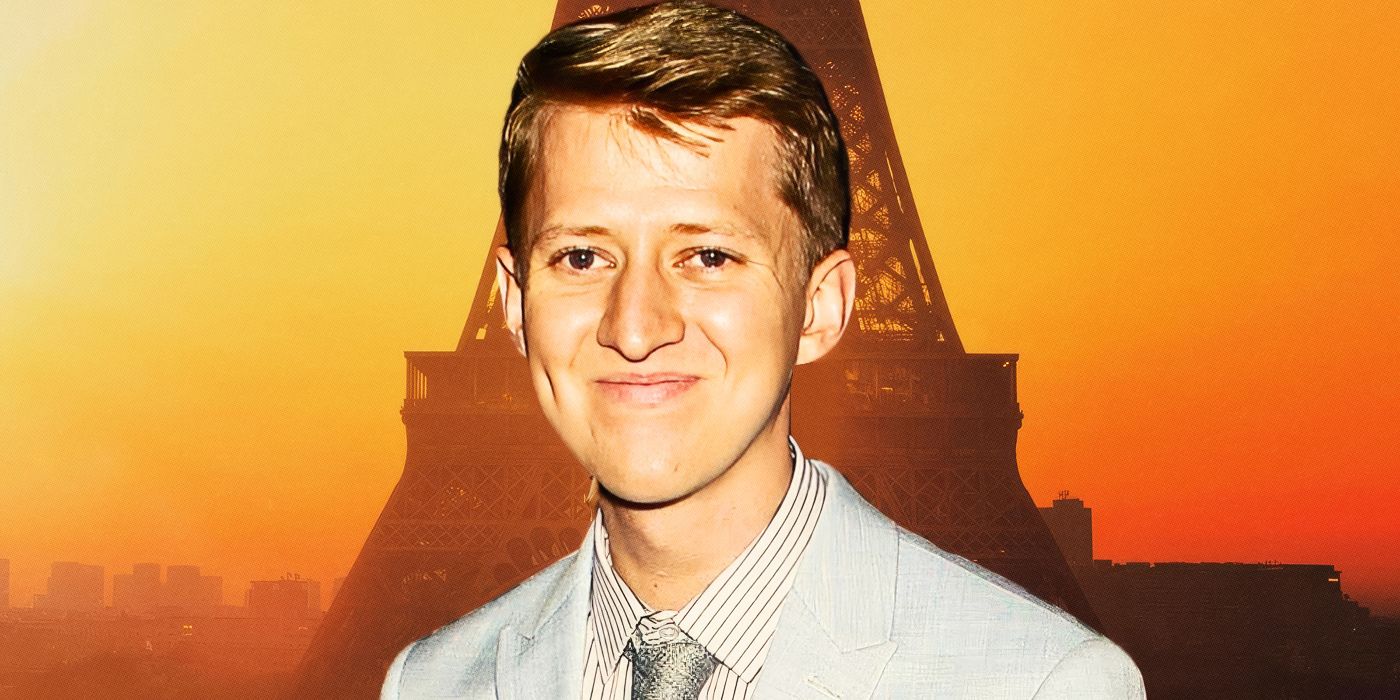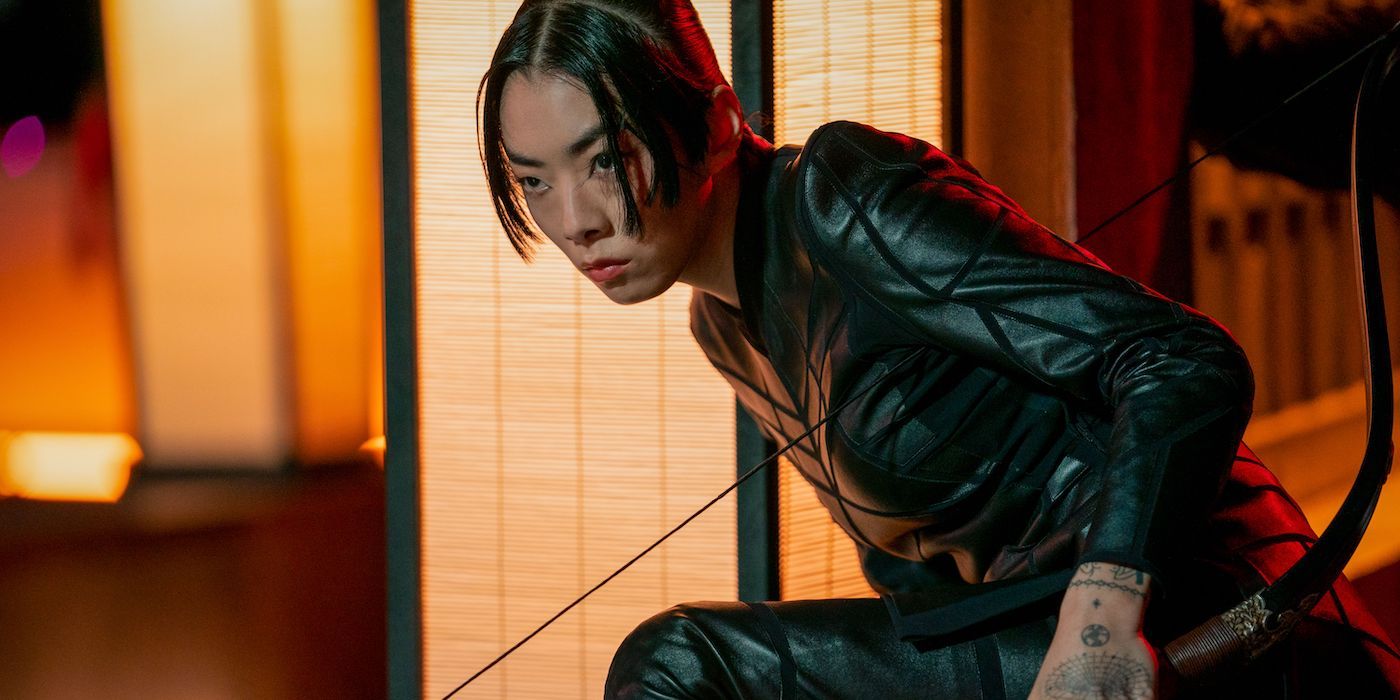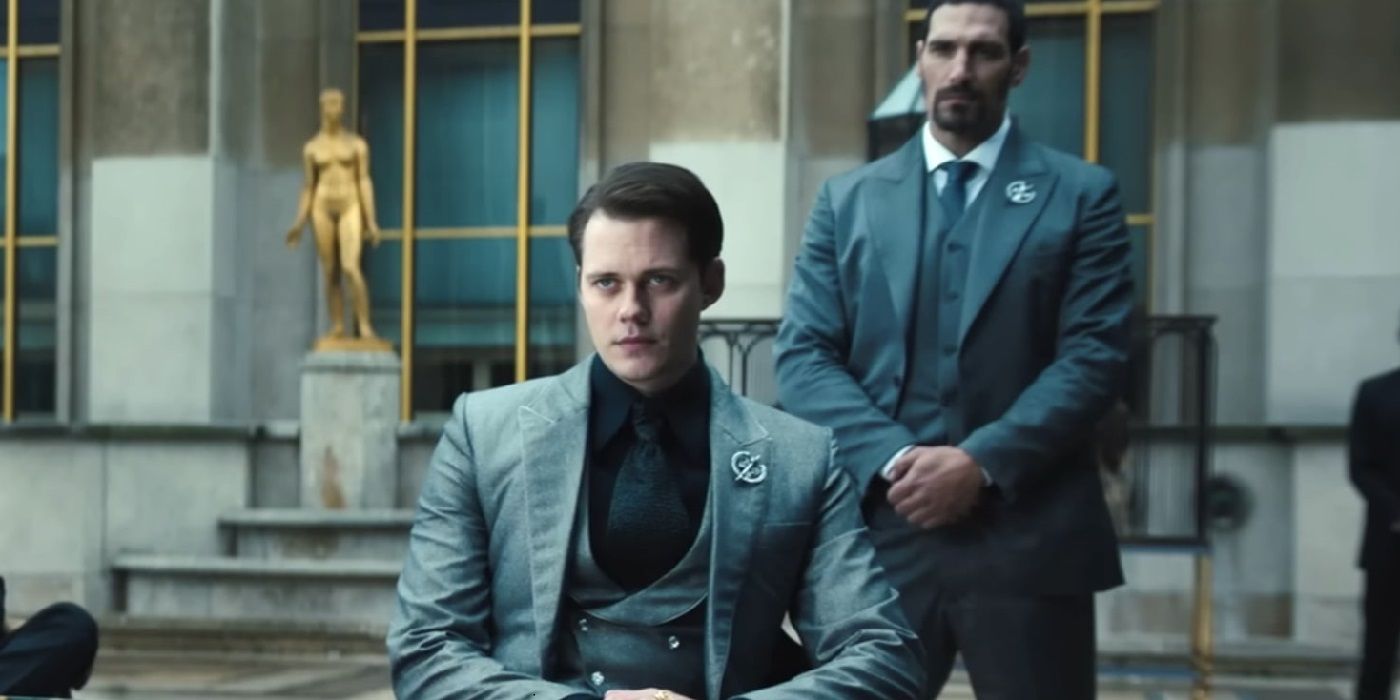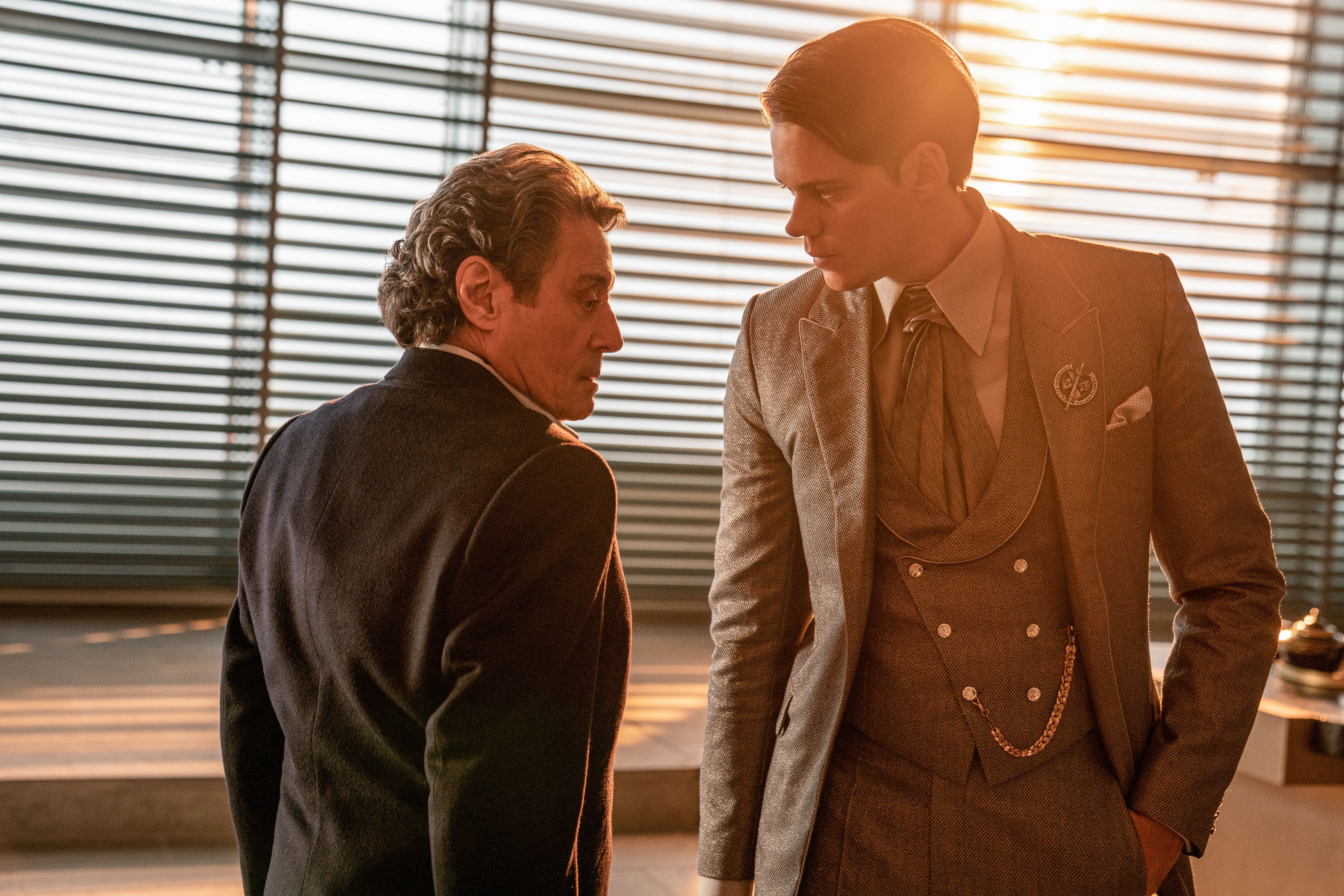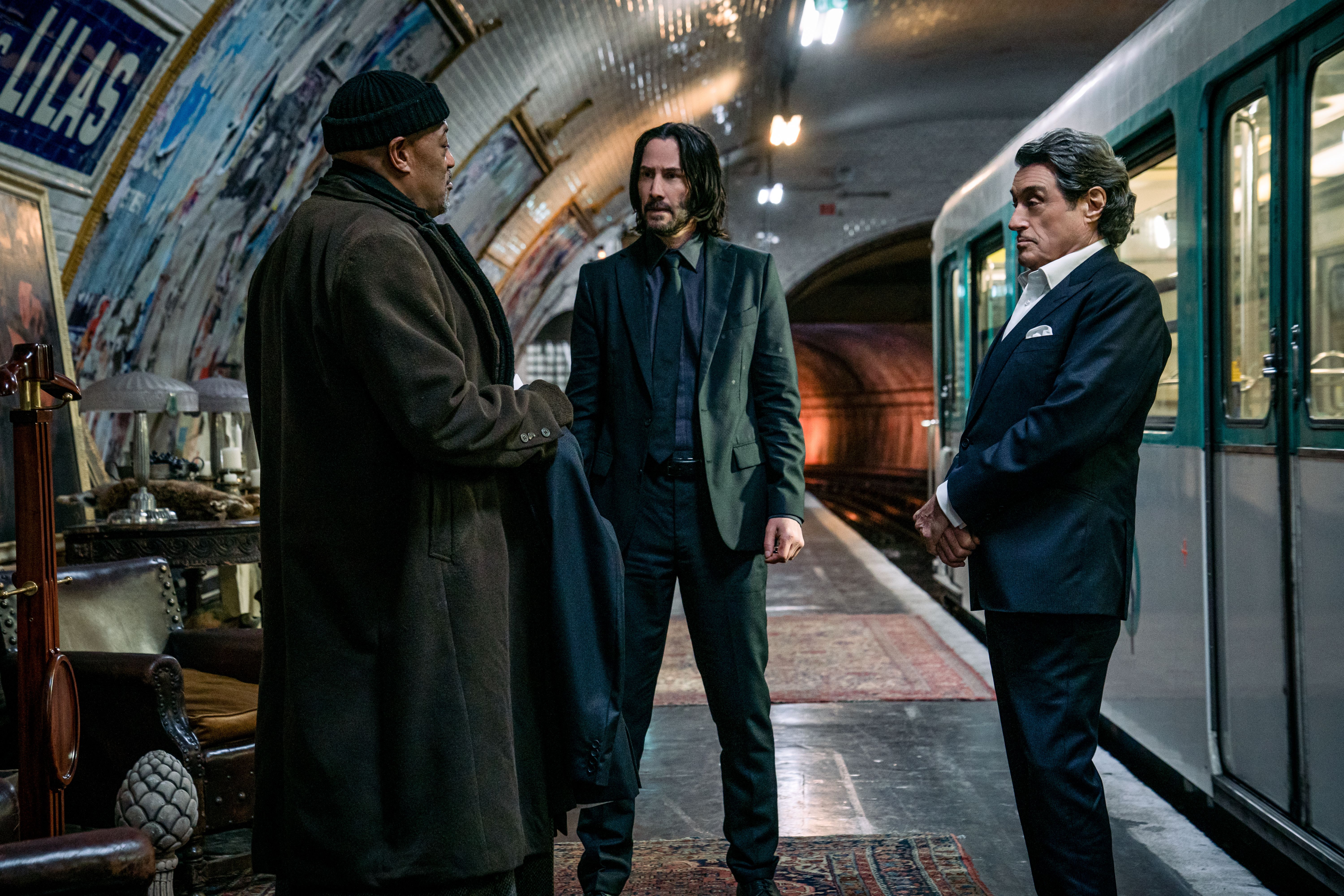John Wick: Chapter 4 is officially in theaters, and we spoke with co-writer Shay Hatten about the fourth movie in the Wick franchise. Starring Keanu Reeves, John Wick: Chapter 4 follows the titular character in his war against the High Table, a high-ranking group within an organization of assassins who Wick wronged in the previous films. The fourth movie in the series is a non-stop, high-octane neo-noir action film that takes us from the deserts of Morocco to the streets of New York, then to a new Continental hotel in Osaka, and finally all across the city of Paris.
Directed by the stuntman-turned-director Chad Stahelski, John Wick: Chapter 4 takes us deeper into the world of assassins as we meet more figures from Wick's past. We meet Hiroyuki Sanada's Shimazu in Osaka while Donnie Yen's Caine hunts down the hero on behalf of the High Table in a twisted deal with the new antagonist, the Marquis (Bills Skarsgård). While Ian McShane and Laurence Fishburne both return for the sequel, Chapter 4 keeps is in John's shoes as he takes on everything and anything the High Table can throw at him.
I talked with Hatten about his work on the film. On top of Chapter 4, Hatten also co-wrote its previous film John Wick: Chapter 3 — Parabellum, and co-wrote Ballerina, a film starring Ana de Armas set in the Wick Universe. On top of his work on Wick, I also spoke with him about his upcoming film Rebel Moon, the upcoming sci-fi space movie directed by Zack Snyder. Hatten co-wrote the script alongside Snyder and Kurt Johnstad.
COLLIDER: I just saw this movie a couple of weeks ago, and I was blown away. I saw it in IMAX, so my whole body was vibrating by the end of the movie.
SHAY HATTEN: Perfect. That's the best way to see it, is just every punch vibrates the theater, so that's the ideal experience.
Yeah, definitely. There feels like there is a narrative structure to John Wick, even in his fight scenes. How do you incorporate the physical aspects of this film and put them into the script? Is it simply about putting like, "Okay, fight scene ensues," and then you let Chad [Stahelski] kind of go with it or is there more on the page?
HATTEN: It's always a really collaborative experience, and I would say no one sequence comes about the same way. Sometimes it's a line that I or Mike, that we just write in the script trying to fill space, and then Chad reads that line and is kind of inspired by it and builds a whole thing. And sometimes it's the opposite, where it's just Chad has an idea for a sequence, and he needs us to put it in the script so that the departments know what we're doing.
For instance, in the third movie, there was just... In the final fight during the hotel, there was just a part where I had John fall in the pool and somebody shoots at him, and it was one line in the script where there's like an underwater gunfight. And then Chad was like, "Oh, that's a cool idea," and he builds it out into this whole crazy thing where there's a fight in the sauna and the bullets are going underwater in slow motion. And to me, that's the most thrilling, when you're like, "Oh, this was just a thing I jotted down," and then you see it filtered through the genius action mind of Chad Stahelski, and it becomes this incredible thing.
And then sometimes, again, it's like Chad calls me into his office, and he's like, "Sit down. This is how we're doing it. John grabs knives off the walls and throws them like baseballs." And he just has it completely in his mind, and it's already fully formed. So it's a lot of different things. I think it ultimately is a collaborative experience between Chad and his stunt team, what Keanu wants to do. And then us, as the writers, just try to service the best, coolest action possible.
Yeah, I mean, I'm thinking of that dragon's breath scene, and basically his entire time in Paris, and that was... How do you write this out? Is it just like, "He goes to Paris?"
HATTEN: Insert one hour of action now. Yeah. But again, it really is... A lot of it is Chad will just go location scouting, and he's like, "I found a staircase, and we're going to film there for 15 minutes of action" and what have you. So I think it is just a lot of it is he's trying to put action in the coolest possible locations he can.
I think he succeeded. So this movie gets a lot more into the world of these assassins and the Continental and the High Table. How is it expanding the scope and the mythology of this world, and how much of it has been planned from previous films?
HATTEN: Well, I think that's what's so thrilling as a writer about working on these movies is it really is a unique thing where it is a giant, big-budget, action franchise that's not built on preexisting IP, except for the IP of the previous movies. The first movie, they never intended to make a sequel. And then it blew up, so they made a second movie. And by nature of making that second movie, they figured out more things about the rules of the High Table and what it means to have a marker. And then on the third movie and now the fourth movie, it's just been an experience of continuing to ask the question of, "Okay, where does it logically make sense for John to go?" And then by following that, you're peeling back the curtain around the corners of the world he goes to.
But it's not predetermined. There's no giant bible that we're kind of following. It's not set in stone. It really is just like, okay, it seems like it makes sense for John to go hide out somewhere after the events of the third movie. It could be cool if he's in Japan. And then by nature of doing that, you build the Osaka Continental. So it really is a natural process of leading with John and not leading with exposition. You lead with John and then peel back the curtain around him just in ways that service the story, but without ever forcing exposition or world-building down people's throats, I think is always our intent.
I also have to say some of these side characters in this film are great. I mean, Hiroyuki Sanada's character Shimazu and his Akira, played by Rina Sawayama, I love that little arc in Osaka. Can you talk about building out these characters and if the actors are involved in how they want to approach it? I mean, especially Shamier Anderson's Tracker character, I feel like there's a lot of layers to that guy that we are not exploring.
HATTEN: Yeah. I think that's what's so special about this fourth movie, is that even in that relationship you mentioned between Hiroyuki's character and his daughter, Rina's character, Akira, and John is like that is a whole kind of story arc that plays out only in the first act of that movie. And that's not something you often get the license to do in a big movie like this. But it really speaks to, I think, to some extent Chad's love of these big, giant action epics where it feels like every character has a backstory. He cites a lot of Leone movies like that, where it's like every person you encounter has their own little agenda, their own set of objectives they're trying to fulfill. And even if it's somebody who just pops on screen for a few scenes, you kind of get a whole sense of their identity through that.
So yeah, it really is just continuing to ask those questions and also to kind of explore different roles within this world. With Shamier's character, it really was like, what does it look like to be in this world if you're not one of the on-the-ground hired gun assassins? He's just a tracker who's not kind of as, I guess, not as inherently violent as other characters. He's more just like, "My skill is I locate people from this world." So that just seemed like a cool opportunity to look at what it looks like to have a different job within this kind of larger industry of the assassin community.
Yeah, for sure. Is there an aspect of this world that you haven't explored yet that you want to or that we might see in Ballerina coming up? Because I feel like there's all these corners of this world that just keep popping up and appearing, and I'm like, "Oh, well, I want to know more about that." So I'm interested in what's cooking in your mind.
HATTEN: Yeah, I mean, I want to know more about all these things too. That's what's fun about being a writer, is I was a fan of these movies first. Just movies one and two came out when I was in college, and they were my favorite action movies. So just getting to come into the franchise is a dream come true as a writer. And again, that's what's so cool about not having a preexisting bible of IP, is we have the freedom to explore these things.
Like, Ballerina starts by introducing a character who kind of went through some of the same training as John in the ballet academy of Anjelica Huston that we see in the third movie. But then she ends up going to a whole new corner of the world and a new kind of isolated community that really is unlike anything we've seen in these previous John Wick movies. I don't think I can say too much more about it. But I do think people will be like, "Oh, that's another kind of cool, unique side of this world that we haven't seen before." And it really is service by story. It's wherever it makes sense for the story to go, we'll go to that part of the world and just try to think of something cool to do there.
I'm so curious about the expansion of this world. Because I know Ballerina takes place in between three and four, right?
HATTEN: Yeah.
How much of Keanu is in this movie, and how much of John Wick's character is involved in it?
HATTEN: Fortunately for me, as the writer, we got him to be in it for a good chunk. He's a real character, and it's not just kind of a one-piece cameo. He's got... Well, I shouldn't say too much, but he's in the movie in a way that I think people are going to be really excited by. And it was cool because it really was... Again, the only reason we set it between three and four was because it felt like there was kind of a cool window of time for John there, because at the end of the third movie, he's been shot off the roof. He's really kind of beaten up, and then he recuperates in the Bowery King's basement.
And by the time the fourth movie starts, he's healed. He's on a different side of the world. And we just thought, "Okay, how did he get from point A to point B? What happened in that little time window?" So it just seemed like a really kind of natural way to fit him in and have him interact with this other character's story during that window. So I think it fills in kind of a missing puzzle piece that people will think is interesting, hopefully.
Okay. Well, I'm excited. And, what can you tell us the progress is on Rebel Moon?
HATTEN: Oh, yeah. Rebel Moon is... I mean, it's in the can. It's in post-production right now. Zack [Snyder] is editing away, and I've seen bits and pieces of it. I've seen scenes here and there and a cut of the trailer. I haven't seen the full movie myself yet, but I'm very, very excited about it. I really feel so lucky to get to work with Zack. I tell him this all the time, but 300 was one of the first R-rated movies that I convinced my parents to take me to see in theaters, which I think he hates me saying because it makes me seem super young. But nevertheless, he's been really an inspiration to me for a long time. And I think with Rebel Moon, people will just see that it's him really getting to unleash his visual imagination to the fullest extent. And I think people will really dig it.
And is Planet of the Dead still happening? I need some updates on that. I need some kind of sign of life.
HATTEN: I don't think I'm allowed to speak to it. I think Zack will find me if I talk about it, so I don't think I'm allowed to say anything.
Okay. Okay. That's totally fine. Back to Wick, I like that we get to explore some of John's past in this film and his deep bonds that he has with Caine (Donnie Yen) and with Shimazu, and also the ex-crime family he was a part of. Can you talk about the decision to dive deeper into that history? I know that you're saying it's starting with John, but how do you decide what direction you want to go into?
HATTEN: It's, as always, kind of a mix. Again, I'm just a huge fan of these movies first and foremost, and I think coming in and just watching the first movie, what's so cool about that first movie is how much of the backstory is implied, right? Because if you ever had a complete bible of these are the exact missions that John went on and this is exactly who he met, John would become less interesting. He's interesting because he's such a mystery and there's such a mystique around him. And even in the first movie, his relationships with Winston or with Willem Dafoe's character are kind of unspoken. And I think that's what we tried to just really tap into and kind of respect that ethos in this movie, was we did want a sense that these are characters that he has a real respect with. I think with both Hiroyuki's character and Donnie's character, I think those are both men who he has incredible respect for, who he probably considered brothers at some point in the past and went on a lot of missions with.
But what's so fun about it is that I think the ambiguity really does invite the audience to imagine what those adventures were. And our intent as writers is always to leave it a little open-ended so that you can continue to enjoy the myth of just imagining the thousands of adventures that John would've gone on. So yeah, it really is just like we kind of want there to be a sense of implied backstory, because that helps the emotion. It helps to know that there's a sense of respect between John and Donnie, even though they're going to fight each other. But we never want to overly define it because, again, the mystery, I think, is half the fun.
Yeah, I understand that. I also just asked the questions because I feel like when I'm writing stories and I'm writing about characters, even if it's vague, I have a whole idea in my mind. It's all painted out there.
HATTEN: Totally.
Given the fact that there are so many little pockets of his life, I'm curious if there's ever been any talk or suggestion of a prequel for John Wick with a younger actor, or is it just impossible to replace Keanu in this role? I think it's so synonymous with him.
HATTEN: Yeah. I wouldn't be shocked if somebody tried it at some point down the road, but it would be daunt... To me, that's like trying to cast the young Han Solo. It's just so iconic and hard to fill. And again, I really do think what's so fascinating about the character of John Wick is that everybody involved in these movies might have a different idea of what his specific backstory is. I know that Keanu has a lot of ideas about John's past that are really compelling, and Chad has a lot of ideas about John's past that are compelling, and I have ideas that I like to kind of imagine about. And those might not be the same thing because it really is just never overly defined.
And I really do think that's kind of what's exciting about it, is that I think a prequel would kind of take out some of the mystique for John's specific character. I think it's more fun to keep getting nuggets of information like, oh, he went to this ballet theater at one point in his past and knew Anjelica Huston's character, and that was kind of a part of his upbringing. But I think it's more fun to kind of get it in little drips and drabs and then try to put the puzzle together in your mind, than it would be to get all the explicit answers.
No, I agree. And then just quickly, speaking about Ballerina again, because I realize that you wrote the script alongside Len [Wiseman], but also Emerald Fennell. Can you talk about working with her on that script?
HATTEN: Yeah. So that was actually during an interim when I wasn't on it. I wrote the original script, then was rewriting it. And I think it was when Ana [de Armas] came on, Emerald came on and did a pass at it. And then I came back on later and read her draft, and I was like, "It's great," because she's a genius. So it was like she kind of, I think, put a lot of ideas in there that, as is the nature of the thing, some of them stuck and are in the movie, and some of them we kind of developed away from again as it was going into production. But I do think it was really cool to kind of have a writer that I'm such a fan of just come in and put kind of a touch on the character. So I think it probably brought a lot to the movie.
Amazing. Well, thank you so much for speaking with me, and I really can't wait for everybody to see this.
HATTEN: Oh, thank you so much.

